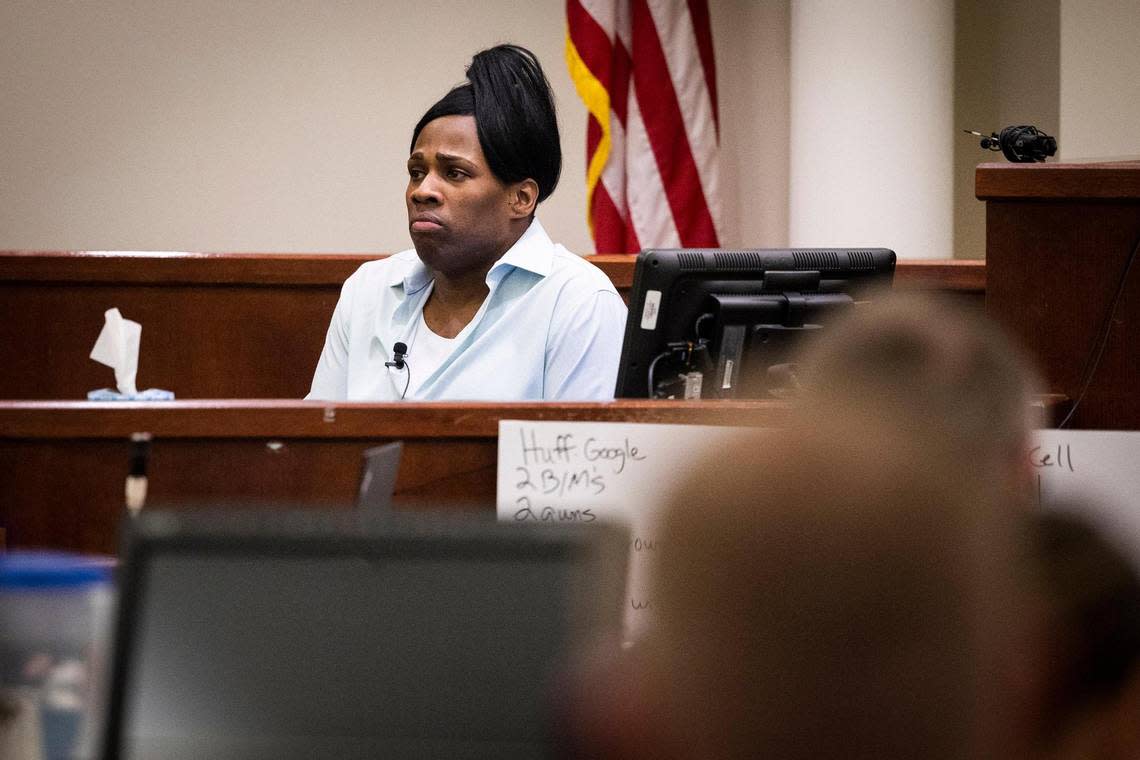In Texas, you can be charged with murder without physically killing anyone. Here’s why.
In Texas, prosecutors can pursue capital murder charges and the death penalty against someone who didn’t physically kill anyone.
The trial and conviction June 27 of Timothy Huff in was the latest example of how the Texas capital murder laws work. Huff will spend life in prison for the death of Fort Worth police officer Garrett Hull nearly four years ago.
While Huff did not pull the trigger, the jury found Huff legally responsible in Hull’s death.
In Texas, the “law of parties” dictates that a person can be found criminally responsible for the actions of someone else when there was a conspiracy to commit one crime and another felony occurs. In this case, Huff was found responsible for the actions of Dacion Steptoe, who shot and killed the officer after the group robbed a bar. Steptoe, Huff and Samuel Mayfield were suspected in a string of violent robberies targeting Hispanic-run businesses.
On Sept. 13, 2018, Steptoe, Huff and Mayfield robbed the south Fort Worth bar Los Vaqueros at gunpoint, according to testimony. Hull chased down Steptoe as the group ran, and Steptoe shot Hull in the head. Steptoe died when another officer shot him. Hull was rushed to the hospital and died the next day.
Under Texas penal code, if someone is involved in a crime and “intended to kill… or anticipated that a human life would be taken,” that person can be charged with capital murder. The prosecuting attorneys in Huff’s case successfully proved Huff anticipated someone could die during the robberies, and therefore was just as guilty as Steptoe.
“This case is textbook for how someone is guilty of capital murder even when they didn’t pull the trigger,” prosecutor Timothy Rodgers said during closing arguments.
Hull, a father of two, was posthumously promoted to corporal after his death.
The law of parties has been used in several other recent Tarrant County cases.
Shooting of Francisco “Panchito” Macias
Four people have been charged with capital murder in the death of a man who police say was shot during an attempted robbery in October 2020. Mante Smith, 18; Derrick Daniels, 20; Jeremiah Daniels-Simon, 21; and Alicia Jean Peoples, 19, are charged in the killing of Francisco “Panchito” Macias, 49.
Family members heard gunshots and later found Macias’ body in front of the pickup he drove every morning to his job as a forklift operator at Willbanks Metals.
Police have said four people were in a car that approached Macias, who was shot in the head. Investigators have not said who is suspected of firing the gun. The cases are pending.
Shooting of Paul Ramirez
Three people are charged with capital murder in a killing at a Fort Worth hotel in August 2020.
Paul Ramirez, 19, was shot in a room at the Magnuson Hotel during a marijuana sale, according to police affidavits. Darion Gayden, 18; Map Bieng, 18; and Samario Robertson, 19, are charged with capital murder.
According to police, Ramirez and two friends drove to the hotel at 6700 Fossil Bluff Drive so that Ramirez could sell marijuana.
A hotel surveillance video showed Ramirez enter the room about 3 p.m. One minute later, a man later identified as Bieng and a second man also entered the room.
Seconds later, the two suspects can be seen fleeing the room, but at 3:03 p.m., Bieng and two suspects re-entered the hotel room and left seconds later with Ramirez’s backpack.
As in Macias’ death, police have not publicly said who is believed to have pulled the trigger. The cases are pending.
Shooting of Ethan Walker
In the case of Taymor McIntyre, a jury had a slightly different conclusion under the law of parties. McIntyre was charged with capital murder for his involvement in the murder of a 21-year-old father during a home invasion in 2016, but the jury convicted him of murder instead.
In July 2019, McIntyre, also known by his rap name Tay-K 47, was sentenced to 55 years in prison. McIntyre recruited the man who fatally shot 21-year-old Ethan Walker in the 2016 botched home invasion and was present when the man remarked that he was “trigger happy” during a meeting to plan the robbery, according to court testimony.
A 19-year-old woman was also convicted of capital murder. She was 16 and won an appeal for her conviction, which advocates said was an injustice because she was a victim of sex trafficking at the time.
In all, seven people were charged in the home invasion.
Latharian Merritt, the trigger man in Walker’s shooting, was found guilty of capital murder by a jury in May and sentenced to life in prison. Sean Robinson pleaded guilty in August to murder in exchange for a 40-year prison sentence. Jalen Bell pleaded guilty to two counts of aggravated robbery.
Two women — 22-year-old Ariana Bharrat and 21-year-old Megan Holt — made plea deals on a lesser charge of aggravated robbery and received a 25-year prison sentence and a 20-year sentence, respectively.
Law of parties revised
In 2021, a bipartisan bill passed in the Texas House narrowed the use of the law of parties. Previously, any accomplices in a felony could be criminally liable for the acts of everyone involved.
The bill clarified that only participants who intended or anticipated a death would have taken place can be charged with capital murder under the law of parties. The change was prompted by the case of Jeffrey Wood, who was sentenced to death for his involvement in a robbery in which another man killed a store clerk while Wood was waiting in the parking lot in a car. Wood’s attorneys argued he was not aware the robbery was happening. Wood’s execution was stayed in 2016.
According to the Death Penalty Information Center, 11 people who did not directly kill the victim have been executed in the country.


